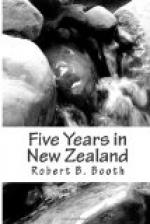Within twenty miles of Highfield was another station, called Parnassus, belonging to Mr. Edward Lee, our Mr. Lee’s brother. We soon rode over to see him, and made excursions to other neighbours, none living nearer than ten miles.
There were upwards of one hundred horses at Highfield, including all ages and sexes, of which the main body of course ran wild, while a few were kept in paddocks for use. The horse Mrs. Lee rode from Christchurch was a new purchase and a very fine animal, named Maseppa, and, strange to say, although he carried her perfectly all the journey to Highfield, he had now, after a few weeks on the run, developed into a vicious buckjumper. One day, when Mr. Lee wanted to ride him, he was driven in with the mob and saddled. Immediately he was mounted the brute bucked and sent Mr. Lee flying. Fortunately the ground was soft, and he escaped with a few bruises. C—— then had a try, with more success, but the horse was never safe for a lady to ride, and he was soon after disposed of to a stock-rider on the Waiou.
It may be interesting here to give a general sketch of a sheep-farmer’s life and work on his station, obtained from my experience at Highfield, and occasionally on other runs, during my five years’ residence in the country, and this I will endeavour to do in the next chapter.
CHAPTER V.
WORKING OF A SHEEP-RUN—SCAB—C——’S DEPARTURE FOR HOME, ETC.
The intending squatter might either purchase a sheep run outright, if opportunity offered, or if he was fortunate enough to discover a tract of unclaimed country, he could occupy it at once by paying the Provincial Government a nominal rental, something like half a farthing an acre. This would only be the goodwill of the land, which was liable to be purchased outright by anybody else direct from Government, at the upset price fixed, which in Nelson was one pound per acre for hilly land, and two pounds for flat land suitable for cultivation. Nobody could purchase outright a run or portion of it while another occupier held the goodwill of it without first challenging the latter, who retained the presumptive right to purchase.
To protect themselves as much as possible from land being purchased away from them, or from being obliged to purchase themselves, goodwill holders were in the habit of buying up the best flat land, as well as making the land around their homesteads private property. A run so divided and cut up would not be so tempting to a rich man, and would effectually debar the man of small means, as the present occupier would not sell his private property unless at a price which would reimburse him for the loss of his interest in the goodwill of the run, and the new-comer, if he did not possess the scraps of private property as well as the remainder of the run, would be continually harassed by the previous owner occupying the best portions, and would be liable to fine for trespass, etc.




